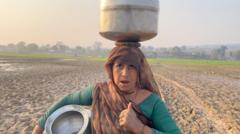In Madhya Pradesh, a colossal river-linking project intended to alleviate drought is facing fierce opposition from locals who fear losing their livelihoods and homes.
Massive Protests Erupt Over River-Linking Project in India

Massive Protests Erupt Over River-Linking Project in India
Thousands of villagers oppose a multi-billion dollar scheme they say threatens their homes.
The Ken-Betwa project, budgeted at 440 billion rupees (approximately $5.06 billion), aims to channel excess water from the Ken River to the Betwa River via dams and canals. This ambitious initiative, part of a 16-project plan outlined in India's National Perspective Plan for water resource management initiated in the 1980s, was recently revived after years of delays attributed to environmental concerns and political wranglings. Prime Minister Narendra Modi laid the project’s foundation stone in December 2022, with an anticipated completion by 2030.
Supporters of the project argue it will bring much-needed irrigation to the drought-prone Bundelkhand region, which encompasses parts of Madhya Pradesh and Uttar Pradesh, battling chronic poverty due to harsh climatic conditions. The government estimates the project will irrigate 1.06 million hectares, provide drinking water for 6.2 million people, and generate 130 MW of renewable energy.
However, grassroots protests are intensifying, with up to 10 villages facing displacement and over 7,000 families at risk of losing their homes. Among the demonstrators is Tulsi Adivasi, who voiced concerns over the uncertain future: “Our livelihoods are tied to this land – we don't know what the future holds for us anymore.” Many protestors belong to indigenous tribes, reliant on agriculture and forests.
Environmentalists warn the project will inundate approximately 98 square kilometers of the Panna Tiger Reserve—impacting years of conservation efforts that revived the tiger population in the park. Concerns have previously been raised by an expert panel regarding the project's viability and potential environmental damage.
Baleshwar Thakur, head of the National Water Development Agency, asserts that thorough research and environmental clearances were obtained, promising measures to conserve affected wildlife habitats. But villagers remain unconvinced about the adequacy of the compensation offered—monthly payments versus lump sum payouts do little to quell anxiety over their imminent displacement.
Protest songs echo the sentiments of despair: “Ken-Betwa dam is built by the government, it gives others water but drowns us.” Many question the fairness of a project that supports neighboring regions while their own lacks basic infrastructure. Locals like Lakshmi Adivasi express the sorrow that the very project meant to elevate their community may instead further entwine them in poverty.
Critics argue the government’s reliance on outdated data to justify water allocation and express fears of setting a precedent for future projects endangering vulnerable ecosystems. As protests reach a boiling point, the local communities demand to be heard in a dialogue about development, progress, and the intrinsic right to land.
Supporters of the project argue it will bring much-needed irrigation to the drought-prone Bundelkhand region, which encompasses parts of Madhya Pradesh and Uttar Pradesh, battling chronic poverty due to harsh climatic conditions. The government estimates the project will irrigate 1.06 million hectares, provide drinking water for 6.2 million people, and generate 130 MW of renewable energy.
However, grassroots protests are intensifying, with up to 10 villages facing displacement and over 7,000 families at risk of losing their homes. Among the demonstrators is Tulsi Adivasi, who voiced concerns over the uncertain future: “Our livelihoods are tied to this land – we don't know what the future holds for us anymore.” Many protestors belong to indigenous tribes, reliant on agriculture and forests.
Environmentalists warn the project will inundate approximately 98 square kilometers of the Panna Tiger Reserve—impacting years of conservation efforts that revived the tiger population in the park. Concerns have previously been raised by an expert panel regarding the project's viability and potential environmental damage.
Baleshwar Thakur, head of the National Water Development Agency, asserts that thorough research and environmental clearances were obtained, promising measures to conserve affected wildlife habitats. But villagers remain unconvinced about the adequacy of the compensation offered—monthly payments versus lump sum payouts do little to quell anxiety over their imminent displacement.
Protest songs echo the sentiments of despair: “Ken-Betwa dam is built by the government, it gives others water but drowns us.” Many question the fairness of a project that supports neighboring regions while their own lacks basic infrastructure. Locals like Lakshmi Adivasi express the sorrow that the very project meant to elevate their community may instead further entwine them in poverty.
Critics argue the government’s reliance on outdated data to justify water allocation and express fears of setting a precedent for future projects endangering vulnerable ecosystems. As protests reach a boiling point, the local communities demand to be heard in a dialogue about development, progress, and the intrinsic right to land.





















